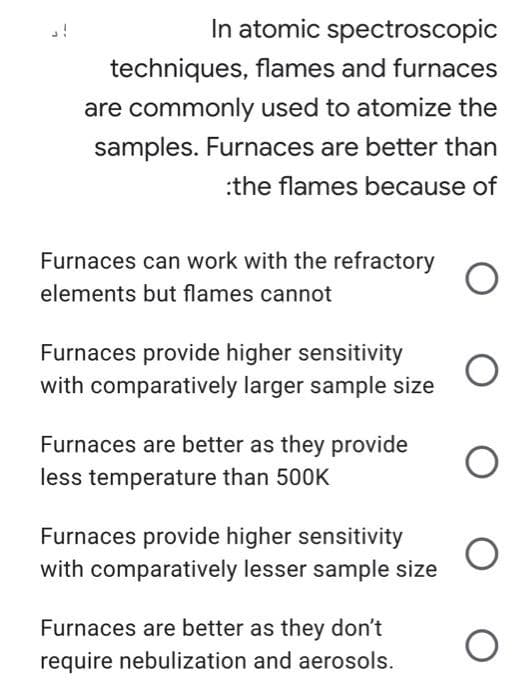In atomic spectroscopic techniques, flames and furnaces are commonly used to atomize the samples. Furnaces are better than :the flames because of Furnaces can work with the refractory elements but flames cannot Furnaces provide higher sensitivity with comparatively larger sample size Furnaces are better as they provide less temperature than 500K Furnaces provide higher sensitivity with comparatively lesser sample size Furnaces are better as they don't require nebulization and aerosols.
In atomic spectroscopic techniques, flames and furnaces are commonly used to atomize the samples. Furnaces are better than :the flames because of Furnaces can work with the refractory elements but flames cannot Furnaces provide higher sensitivity with comparatively larger sample size Furnaces are better as they provide less temperature than 500K Furnaces provide higher sensitivity with comparatively lesser sample size Furnaces are better as they don't require nebulization and aerosols.
Principles of Instrumental Analysis
7th Edition
ISBN:9781305577213
Author:Douglas A. Skoog, F. James Holler, Stanley R. Crouch
Publisher:Douglas A. Skoog, F. James Holler, Stanley R. Crouch
Chapter31: Thermal Methods
Section: Chapter Questions
Problem 31.4QAP
Related questions
Question

Transcribed Image Text:In atomic spectroscopic
techniques, flames and furnaces
are commonly used to atomize the
samples. Furnaces are better than
:the flames because of
Furnaces can work with the refractory
elements but flames cannot
Furnaces provide higher sensitivity
with comparatively larger sample size
Furnaces are better as they provide
less temperature than 500K
Furnaces provide higher sensitivity
with comparatively lesser sample size
Furnaces are better as they don't
require nebulization and aerosols.
Expert Solution
This question has been solved!
Explore an expertly crafted, step-by-step solution for a thorough understanding of key concepts.
Step by step
Solved in 2 steps

Knowledge Booster
Learn more about
Need a deep-dive on the concept behind this application? Look no further. Learn more about this topic, chemistry and related others by exploring similar questions and additional content below.Recommended textbooks for you

Principles of Instrumental Analysis
Chemistry
ISBN:
9781305577213
Author:
Douglas A. Skoog, F. James Holler, Stanley R. Crouch
Publisher:
Cengage Learning


Principles of Instrumental Analysis
Chemistry
ISBN:
9781305577213
Author:
Douglas A. Skoog, F. James Holler, Stanley R. Crouch
Publisher:
Cengage Learning
